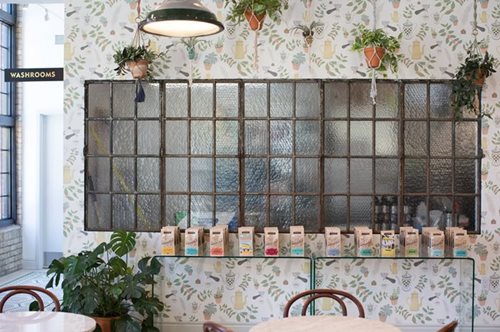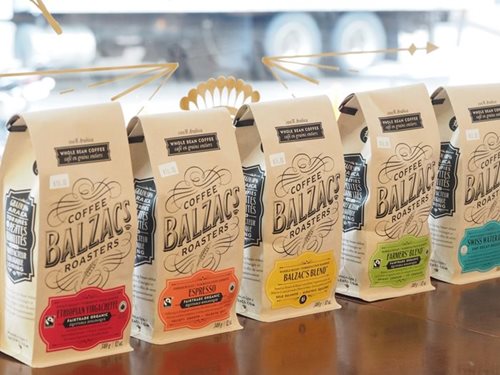Credited as the founder of European literary realism, French polymath Honoré de Balzac dedicated many pages to his legendary love of coffee. His 1830s essay ‘The Pleasures and Pains of Coffee’, describes the beverage as the ‘great power’ in his life. Little could Balzac have known how that sentiment would resonate through history, and across the world, to modern-day Toronto.
Having celebrated its 25th anniversary in 2019, Balzac’s Coffee Roasters has been a key driver of appreciation for boutique café experiences and premium coffee in Canada. Today the brand operates 15 cafés across Toronto and Ontario while its roastery produces around 12 tons of coffee a month for wholesale and retail customers.
“Our mission statement is a quote from Balzac: ‘The café is the people’s parliament’,” says the business’s founder, Diana Olsen.
Under this cause du jour, the business has always sought to create inclusive environments for customers – from laptop-laden students, to parents with children and morning commuters. “We don’t want to impose our look and feel onto a neighbourhood. Instead, we integrate a neighbourhood’s look and feel into our cafés,” Olsen explains.
In her role as Chief Design Officer, Olsen is going back to her visionary roots, playing a central role in sourcing new locations as well as leading the design of each new café. “As the business grew the amount of pressure on my former position became so great that I made the decision to hire a CEO, Ron Cecillon, who has extensive experience in scaling a business. I can now focus on the things that I love and that I’m good at, which are the creative aspects of the job.”
Olsen leads the creative direction of each new build-out with an architectural and design team, completing the interior finishing herself. This hands-on approach ensures each Balzac’s store is decidedly unique while remaining firmly on-brand.
It has been a busy few months for the boutique chain as it prepares to open another five cafés between 2020-2021. It is by no means breakneck expansion, but Olsen explains the nature of Balzac’s boutique café expansion is characterized by organic growth, which means finding the very best neighbourhood spots for the brand. It can then take months, sometimes even years, for the right property opportunity to arise.
“We are extremely selective with new locations. More often developers approach us because they like our brand and they think it’s a good fit for the development as a whole.”
Once a site is secured, Olsen then feeds back to her design team on how a new store should look and feel in order to complement its surroundings and clientele.

Establishing the brand 25 years ago
Looking back over the last 25 years, Olsen says the company still feels young. “We’re at 15 cafés but that is certainly not an overnight success story, it’s been very measured and organic growth,” she says.
Olsen established her first wholesale coffee and mobile kiosk business in 1994 before opening the first Balzac’s Coffee Roasters store in Ontario in 1996. At that time Canada’s coffee shop landscape was very different as 2nd wave chains, such as Tim Hortons, Starbucks, and Second Cup established themselves in the market.
Emerging amid the expansion of these large chains, Balzac’s proposition of premium coffee served in unique, boutique spaces stood out in the nascent 3rd Wave café market.
“We were not second or 3rd wave, we were 2.5,” says Olsen.
Through the years that followed, Olsen has seen many trends come and go but has always stuck to her core principles of ethically sourced and well-prepared, quality coffee. Balzac’s experimented with 3rd wave brewing trends such as pour over and French press, but these presented their own operational problems. “Going into pour over when you have a long line of customers who are used to getting their coffee very quickly did not go over very well. It felt like taking a step backward for us.”
It just goes to show that 3rd wave craft coffee and 2nd wave convenience do not always mix. Instead, Balzac’s still offers its wide range of single origin, light and dark roasted coffees, as well as its signature blend made using Simonelli, and more recently, Victoria Arduino Black Eagle espresso machines.

Today, Toronto’s coffee shop market, where most Balzac’s stores are located, is characterised by fierce competition. There are now tens of independent coffee shops in the city’s buzzing café scene. Olsen estimates there are around a dozen boutique brands setting the bar in the 5th Wave market of scaled boutique coffee shops. “We’ve never looked for locations, they have always come to us, but recently we have become more proactive in seeking locations because there are just so many competitors you have got to be a bit more aggressive.”
Younger consumers, particularly Millennials and Generation Z, continue to drive market adoption of specialty coffee, including a wider range of origins and growing interest in direct trade. On these points Balzac’s is key a proponent of ethical and sustainable coffee in Canada. Balzac’s lays claim to being the first coffee company in Canada to become LEAF (Leaders in Environmentally Accountable Food Service) certified. The business serves 100% organic and local dairy products and donates all unsold food to charities Second Harvest and FoodRescue.ca.
Olsen is also personally involved with work at origin, including the Las Rosas Women’s Group in Colombia. Here Balzac’s has partnered with Montreal-based green bean supplier RGC Coffee to promote gender equality and leadership development among the coffee cooperative of over 400 Colombian women.
For Olsen, expansion has been on the business’s own terms, something which has allowed the brand to grow independently without compromise. As a longstanding member of Toronto’s café community, Olsen is thrilled by the expansion of coffee culture in the city but concedes today’s entrepreneurs are likely to encounter a far less hospitable trading environment compared to when Balzac’s launched.
“If you want to open a café or roastery and you’re happy to keep it small and independent, there might still be room. Otherwise you’re going to need capital to effectively promote your brand because there are just so many great brands out there making it more difficult to stand out. The days of bootstrapping it with measured, self-financed growth that we started with are being firmly replaced by accelerated, investor-driven growth – and it sometimes feels like we are in a race.”
Nevertheless, Balzac’s has surely etched itself in Toronto’s coffee shop history and is set for a new phase of innovation and expansion.
As the great Balzac himself would surely attest – you can’t rush a work of art.
This article orignially appeared in 5THWAVE magazine.